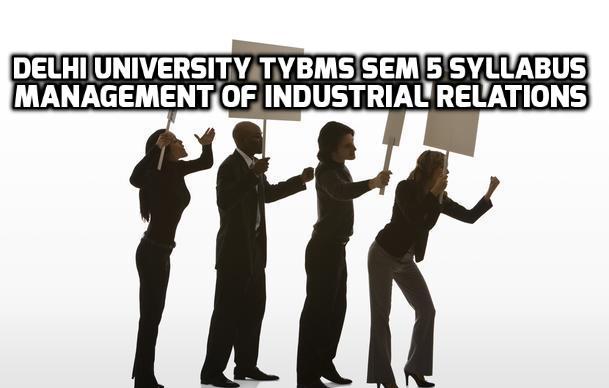Industrial relations or employee relations or employment relations is the study of examining various employment situations to a large degree which includes collective bargaining, trade unionism and labor management relations. Today in reality, labour unions are declining and fewer companies have industrial relations functions. The challenge of industrial relations is to re-establish itself in the academic, policy and business world.
Management of Industrial Relations aims to acquaint the DU BMS students about concepts of industrial relations and its application in the Indian context.
Here we present Delhi University TYBMS Sem 5 Syllabus – Management of Industrial Relations:
Unit 1 – 8 lectures
- Impact of changes in industrial environment on industrial labor
- Features of industrial labor
- Profile of Indian managers – traditional, contemporary, women managers
- Managerial styles – authoritarian, paternalistic and democratic.
Unit 2 – 15 lectures
- Concept of industrial relations
- Aspects of industrial relations – conflict and cooperation
- Parties in industrial relations – workers, employers and government
- Significance of industrial relations
- Factors affecting industrial relations
- Approaches to industrial relations
- Human relations
- Pluristic
- Social action
- Systems approach
Unit 3 – 12 lectures
- Trade unions – concept
- Objectives of trade unions
- Functions
- Methods of trade unionism – mutual insurance
- Collective bargaining
- Legal enactment
- Direct action
- Structure of trade union
- Outside leaderships in trade union
- Why workers join trade unions
- Importance of trade unions
- Problems of trade union in India
- Measures for strengthening trade union.
Unit 4 – 16 lectures
- Worker’s participation in management objectives
- Levels of participation
- Requirement of effective participation
- Modes of worker participation in India – work committees
- Joint management councils
- Collective bargaining
- Co-partnership
- Worker director
- Suggestion schemes
- Grievance procedures
- Quality circles
- Problems of workers’ participation in India
- Employee empowerment – meaning, elements, conditions and process
- Layoff
- Retrenchment
- Discharge
- Dismissal
Unit 5 – 5 lectures
- Labour absenteeism and turnover
- Concept of labour turnover, causes, effects
- Costs of labour turnover
- Control of labour turnover
- Concept of absenteeism, causes, effects and measure to control absenteeism
Textbooks and Reference:
- Industrial Relations – S.C. Srivastava
- Industrial Relations – T.N. Chhabra
- Personnel Management – Monappa and Saiyaddin
- Industrial Relations – C.S. Venkata Raman
- Industrial Relations – Dwivedi




47 Comments